After a week-long drama, Google has restored the Android client of MetaMask on its Play Store.
The update was made public on the first day of the decade by the Blockchain platform on Twitter, in which it revealed that the decision was taken after “careful consideration.”
Happy New Year! Upon careful consideration, Google has permitted The MetaMask mobile app back on the Google Play (Android) store! Thanks to all the believers in an open web for speaking out in our support! https://t.co/Z8KOCtvHq0
— MetaMask (@metamask_io) January 1, 2020
War against crypto?
As Finance Magnates reported earlier, Google abruptly came after the widely used Ethereum wallet and decentralized application (DApp) browser and banned its Android application from its Play Store last week.
Though Google only cited violation of its financial services policy on the part of MetaMask, the tech giant did not elaborate its reason behind the harsh decision.
Google does not allow any applications on the Play Store to offer crypto mining services to its users. As MetaMask does not provide any mining services, many industry experts saw the move as a clampdown on the crypto industry.
The speculation became strong when the California-headquartered giant also refused an appeal against its decision by MetaMask.
In the last week, the MetaMask Android client was suspended by the Google Play App Store @googleplaydev. They cited their policy that bans mining on mobile, which we don't. Appeal rejected. #ProtectWeb3.https://t.co/rfP4EbOAqv!?zippy_activeEl=Cryptocurrencies %23cryptocurrencies
— MetaMask (@metamask_io) December 26, 2019
The issue with MetaMask is similar to the confusion created on the part of Google with multiple crypto-specific content creators.
Google-owned YouTube recently took down multiple crypto-specific videos, even targeting many large content creators. However, the video-sharing platform admitted that this was done in error and has started to restore the videos.
This made the crypto-specific influencers rethink their dependence on a centralized platform as many had started to explore some decentralized alternatives.

















